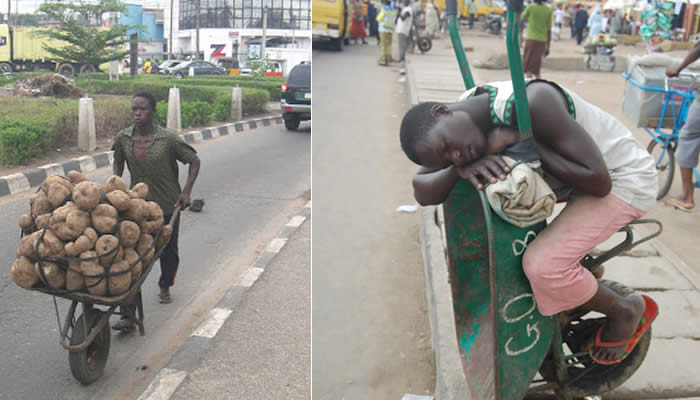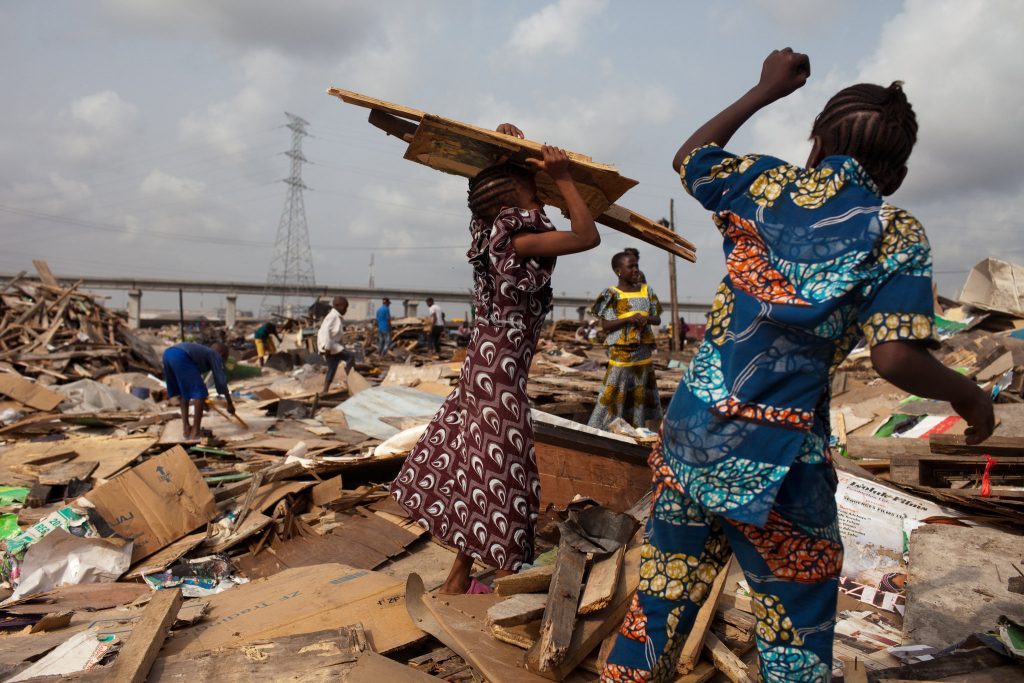Learn about homelessness in Lagos Nigeria, and understand its causes, effects and mitigation efforts.
Lagos is Nigeria’s biggest state by human population and, in contrast, the smallest by land. The city-state was historically Nigeria’s capital. That, coupled with the fact that it’s the country’s most industrialized state, explains why the coastal state holds about 20% of the country’s population, standing around 25 million people.
While Lagos is Nigeria’s richest state or jurisdiction, not all of its 25 million can afford a proper roof with proper walls over and around them, as some people without housing in Lagos call slums and under bridges home.
Homelessness in Lagos Nigeria
Lagos, although has Nigeria’s largest GDP, has the worst urban homelessness in the West African country. This is little wonder given two-third of its residents live below the poverty line of $1/day, and, according to estimates, over 70% of this two-third live in informal settlements. This is despite the fact that Nigeria considers habitable housing as a basic human need and the right of every individual (National Affordable Housing Association, 2006).
Further, reports show that most of the people who reside in the informal settlements or makeshift houses have no specific sources of income. They disperse upon dawn to find jobs. While the men are often into wheelbarrow pushing, conveying people’s loads from one place to another, and also work with commercial buses as conductors among other things, the girls and women serve as attendants to roadside food vendors, among other things.

Homeless people in Lagos usually gather around roads leading to markets in busy areas like Oshodi, Ketu, Obalende, Mile 12, Ojota, and Idumota. When the day is done, they return to their dwelling places which include under bridges and other makeshift houses.
The makeshift houses are prone to evictions for various reasons. They may have been built in violation of the city’s mater plan — defying the city’s design, defying waterways serving as drains or violating, say, crude oil pipelines. Gentrification is another good reason for eviction. While this is understandable, it becomes unfair when there’s no compensation made. Eviction may also be provoked by other security concerns; say, chasing away suspected thugs.
These evictions or demolitions can suddenly start without proper notices, pushing Lagos‘ homeless deeper into the homeless life.
While a good deal of the homeless people in the US are mentally ill, in Lagos, they’re not. Nonetheless, some of them feel dejected.
Homelessness is a burden the Lagos government has to deal with as it makes the city less of itself and contributes to insecurity. If the homeless are not experiencing attacks from other homeless people, they’d be experiencing it from the general public or vice versa.
Causes of Homelessness in Lagos Nigeria
Homelessness in Lagos is caused, on the part of the victims, by poverty and, on the part of the government, by a relatively poor economy, as well as a poor government attention to the subject. Further, the homelessness of Lagos is exacerbated by migration.
In Lagos, there are no sufficient jobs for the residents. That’s worsened by a steadily rising inflation. On migration, some national migrants in the commercial hub may either be looking for better opportunities or may be fleeing crisis in their state. Economic migrants who have moved to Lagos without adequate plans may find themselves homeless. As for the fleeing migrants, the situation is like where in Nigeria poor people go to parties uninvited because there’s hope for food and money. Fleeing migrant go to Lagos because it’s the richest portion of the country. There, their hope of survival is perceived to be much better.
Demolition of makeshift houses is a frequent sight in the state, as they’re considered illegal. Since 2000, millions of people have lost what they call home to demolitions.
Patrick Edewor, a don at the Covenant University in Ota, Ogun State, explains the causes of living in the streets in Lagos, “A survey of 447 homeless children and youths in three purposively selected parts of Lagos metropolis … show[s] that majority of the respondents … had low level of education and were from poor and large families most of which were polygynous.
“Parental neglect, discontent at home, marital instability in family of orientation, poverty and peer influence were the major causes of being on the street. They slept under bridges, at the beach, in motor parks and vehicles, in market places, and in uncompleted buildings.”
See: Inevitable causes of homelessness across different countries
Challenges of People without Homes in Lagos Nigeria

Challenges of living without housing varies depending on country. Life for rough sleepers in Lagos is chaotic, insecure and hard. They sometimes get harassed by thugs for money, or by police over security concerns. They experience various forms of insecurity at higher frequencies than the general public and the climatic conditions, particularly, the tropical Sun in Lagos isn’t kind on them, when they go out for their daily bread, whether by doing menial jobs or by begging.
Notwithstanding the inhuman quality of life, the victims of houselessness in Lagos tend to feel it’s normal life. The story of homeless Hassan in Lagos is relevant. He says, “Under a Lagos bridge, you are seen as homeless, but you are, indeed, at home. We have a leader called ‘Alaaye’, whose wife is usually the most beautiful in the commune, and who is the caretaker for yet a big man called ‘omo onile.”
Rather than sulk under the pain of that depravity, Hassan has accepted his faith with equanimity, finding joy in the lack.
Musa Adamu, 25 years old, who fled the insurgency in Borno to Lagos and has been there for more ten years now says, “I am a cart pusher and sleep anywhere. When it rains, I will put my mat in my armpit till the rain stops so I can lay it back,” he said. “The government and people of the state have repeatedly accused us of being responsible for thuggery, so the police usually arrest us. We have no identity card to separate us from the bad guys.”
Saidu Garba, who is 36, is one of the cart pushers in Obalende. Aside from helping people carry loads from park to park, he also moves from one refuse dump to another, scavenging for scrap metals to sell to dealers so he can feed himself and pay necessary bills. Like Musa, he also fled Maiduguri, capital of the northeastern Borno State, following a 2012 Boko-Haram attack that led to the death of his parents. His wife and son moved to Zamfara, which has since become the epicentre of terrorism in the Northwest.
Traffic robberies, which take place both day and night, are said to be perpetrated by thugs living under flyovers. These types of crimes attract raids on the homeless.
In 2011, the police raided homeless Nigerians at midnight in a bid to arrest hard drug dealers, but many of those arrested were innocent. Sodiq was one of them. He was charged to court alongside others and was later convicted. He then spent three years at the Kirikiri Maximum Security Prison in the Amuwo Odofin area of the state.
Since he had no other shelter, he returned to the bridge after serving his jail term. He was again arrested three months after his release. This time, he spent six months at Potoki Prison in Badagry. “I have been arrested more than five times and I have toured Kirikiri and Potoki prisons twice. Despite all I have faced in life, I’m still here because I have no place to go.”
Read: Are homeless people dangerous?
Adedokun Olatundun, 65 years old, who moved to Lagos after losing her husband and three of her six children to an age-long communal crisis between Offa and Erin-Ile communities Kwara says most times she feeds herself with the leftovers from others. When the night falls, she pays a “security fee” of ₦100 to agberos, also known as area boys. The word ‘agbero’ loosely means “to usher passengers”, but it has now become a synonym for thuggery.
While life in the streets is hard, seniors are still respected. Asked how difficult it is to pass the nights on the streets with six children, Muhammed Amina who’s 55 responded, “The streets respect the old regardless of your tribe.”
Muhammed Olayinka, who’s 50, also confirmed that older homeless people are more respected.
It’s not all bearable living off grid in Lagos. Sometimes evictions can be deadly. Amnesty International UK reports the ordeal some unhoused Lagosians experienced, when they stated, “The forced evictions and related attacks in Lagos resulted in at least 11 deaths, some or all of which may amount to unlawful killings. We have also documented reports of people who disappeared during the forced evictions, massive destruction of property, homelessness, loss of livelihoods, separation of families, and children deprived of access to education.”
Read: Should we be kind or unkind to homeless people?

Government Efforts to Provide More Homes
Nigeria created bodies, the National Council on Housing and the Federal Housing Authority (FHA), through National Development Plan from 1970 to 1974 to provide housing for Nigerians, although they have not solved the problem of the shortage of affordable liveable housing.
And while, on one hand, there are lack of affordable housing, on the other, the mortgage is almost none existent. Mortgage loans in Nigeria account for less than 1 percent of the loan portfolio of commercial banks. Also, only about 5 percent, or 685,000 of the housing units in the country are financed using mortgages. These, including the economic situation of the country, create serious housing deficit, with Lagos having the largest share, standing around 5 million.
The Bureau of Public Service Reform (BPSR), was reported to have cautioned that urgent attention should be given to the housing shortage in the country which has made over 108 million Nigerians technically homeless. It also reportedly described the 100,000 houses built yearly in the country as insufficient, adding that it was time for stakeholders to join government’s efforts in providing affordable houses for the people by taking advantage of the ongoing Federal Integrated Staff Housing (FISH) programme.
All is not grim as some state governments are rising to the challenge of providing affordable housing. In April 2023, Lagos is one of the states given credit for the best performance in the development of quality social houses. Lagos can use the tips on solutions to homelessness to fix the epidemic.



